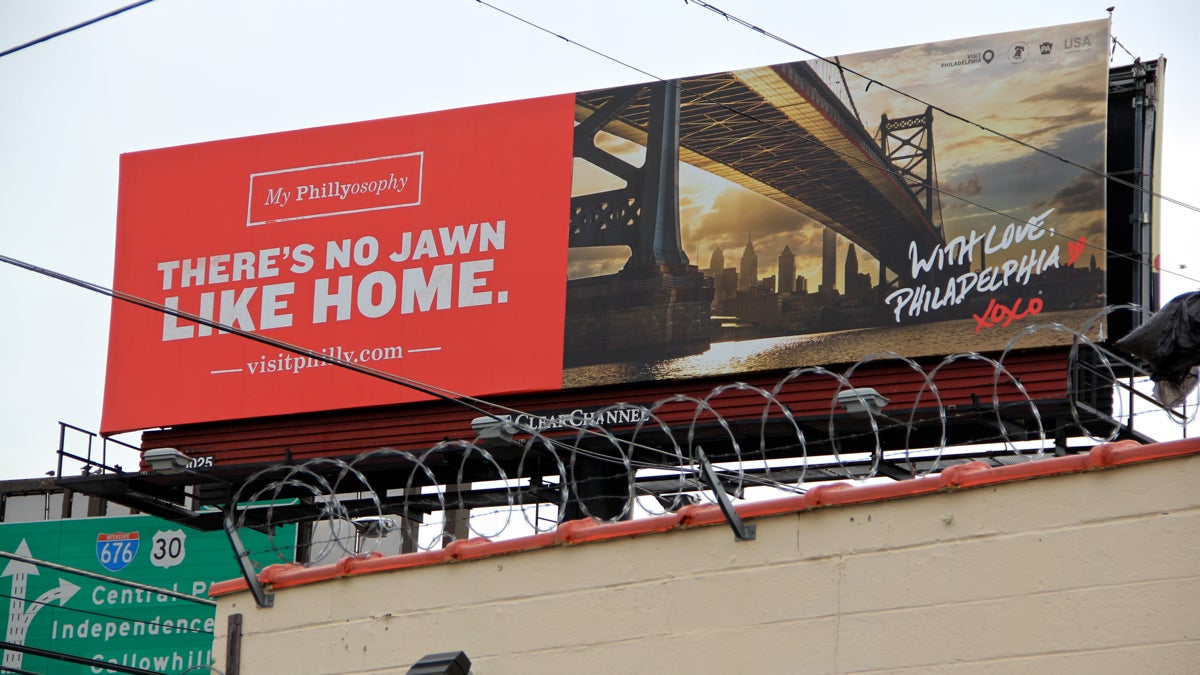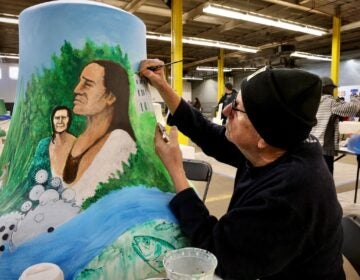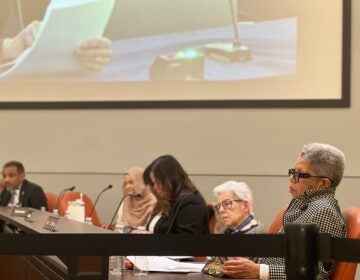Why an actor from Brooklyn can’t talk like a Philadelphian
Listen
A tourism billboard on Interstate 95 touts the Philly sound. (Emma Lee/WHYY)
You may have trouble describing it, but you sure know it when you hear it — the unmistakable Philly accent.
Meredith Tamminga, assistant professor of linguistics at the University of Pennsylvania makes it her work to make sense of variations in language. She visited WHYY to tout the tones and words that make Phillyspeak unique.
 Linguist Meredith Tamminga visits WHYY to talk about the Philly accent. (Emma Lee/WHYY)
Linguist Meredith Tamminga visits WHYY to talk about the Philly accent. (Emma Lee/WHYY)
Of course it’s easy to point to the more obvious examples: “wooder” (water), “Fluffya” (Philadelphia), “beggle” (bagel), “deniss” (dentist). Tamminga points out there are also lexical items like “jimmies,” for the sprinkles you put on ice cream — and “fireplug,” for fire hydrant — or “pavement,” for sidewalk.
She says people often find the Philly accent to be strong, but they don’t always differentiate it very well from the New York accent.
To the linguist’s ear, she says, Philly has a really different accent from that of New York. Tamminga recalls a notable example in the Netflix series “House of Cards.”
“They have these shipyard workers that are supposed to be from Philadelphia, but they have actors with New York accents, real working-class New York accents, and that’s supposed to stand in for Philly,” she said. “But if you know a real Philly accent, you can tell right away that that’s not it.”
The main thing that differentiates North American dialects, apart from the words that people might use in that area, is the pronunciation of different vowels. “When we hear differences between Nashville or New York or Philadelphia, we’re hearing differences in the ways the vowels are pronounced,” she said.
Tamminga notes that, as people move from one part of the country to another, there’s often a tendency to lose some of the more regional or stigmatized features of their original accent — with a wide range of outcomes. “Different people, depending on their ear for language and how sensitive they are to the sort of social meaning to they way they sound, will converge more or less to their new accent home.”
One might think that in a more general sense, America is edging toward a more homogenized sound. Yet some accents are being preserved and, in some senses, strengthening locally and regionally. Tamminga suspects that this is because some accents “fly below the radar.”
“The Southern accent seems to be receding in parts of the South,” she said. “So people who know and stereotype a Southern accent, they hear a Southern accent and have certain ideas about what kind of person that is. But then in the whole Northern cities region, like the areas around the Great Lakes, the urban areas, Chicago, Detroit, Rochester, Syracuse — all of those cities have a very characteristic accent that’s undergoing a number of very rapid vowel changes, and nobody there has any idea. The fact that, for whatever reason, nobody has noticed, it doesn’t have this stereotyped characteristic, seems to allow the change to move forward without being sort of standardized.”
“I’d love people to try out some of the sounds and words of the Philadelphia accent. It should be playful,” she said. “I think language variation is fun and playful. In my opinion, I think it’s something to sort of revel in.”
WHYY is your source for fact-based, in-depth journalism and information. As a nonprofit organization, we rely on financial support from readers like you. Please give today.





